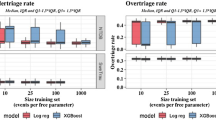Abstract
This study proposes an innovative use of optimized extreme gradient enhancement based on grid search best parameters (Extreme Gradient Boosting, XGBoost) machine learning analyzer evaluates the prognostic state of emergency patients with severe trauma, with two prognostic outcomes, including rehabilitation and death. For patients with a trauma severity score (Injury Severity Score, ISS) greater than 15 in the ISS category of “serious trauma”, the use of XGBoost collects 3 parts of data into a database through emergency trauma patients to the prognostic result analysis, respectively, for hospitalization injury data, physician evaluation data, physician disposal data, and analysis prognotation status. After experimenting with the results of different methods, data attributes and predictive prognosis systems use the XGBoost method with a higher accuracy rate, thus achieving the goal of cost studies, so that medical personnel can learn about some vital signs and trauma scores and other data, you can estimate the prognostic status of patients, better treat emergency trauma patients, improve the probability of prognosis rehabilitation and reduce the risk of fatal.








Similar content being viewed by others
References
Chen, M., Hao, Y., Hwang, K., Wang, L., & Wang, L. (2017). Disease prediction by machine learning over big data from healthcare communities. IEEE Access, 5, 8869–8879
Panayides, A. S., Pattichis, M. S., Leandrou, S., Pitris, C., Constantinidou, A., & Pattichis, C. S. (2019). Radiogenomics for precision medicine with a big data analytics perspective. IEEE Journal of Biomedical and Health Informatics, 23(5), 2063–2079
Feng, M., et al. (2019). Big data analytics and mining for effective visualization and trends forecasting of crime data. IEEE Access, 7, 106111–106123
Lin, R., Ye, Z., Wang, H., & Wu, B. (2018). Chronic diseases and health monitoring big data: A survey. IEEE Reviews in Biomedical Engineering, 11, 275–288
Louridas, P., & Ebert, C. (2016). Machine learning. IEEE Software, 33(5), 110–115
Design Thinking Team. (2018). Three categories of machine learning: supervised, enhanced, unsupervised. In Design thinking in AI.
Chen, T. & Guestrin, C. (2016). XGBoost: A scalable tree boosting system. In Proceedings of the 22nd ACM SIGKDD international conference on knowledge discovery and data mining.
Huang, Y. (2018). XGBoost-A scalable tree boosting system: One of the most commonly used algorithms in the Kaggle competition. In Medium.
Jain, A. (2016). Complete guide to parameter tuning in XGBoost with codes in Python. In Analytics Vidhya.
Prabhu. (2018). Understanding hyperparameters and its optimisation techniques. In Medium.
Joseph, R. (2018). Grid search for model tuning. In Medium.
Ferroni, P., Zanzotto, F. M., Riondino, S., Scarpato, N., Guadagni, F., & Roselli, M. (2019). Breast cancer prognosis using a machine learning approach. Cancers, 11, 328
Rau, C.-S., Wu, S.-C., Chuang, J.-F., Huang, C.-Y., Liu, H.-T., Chien, P.-C., & Hsieh, C.-H. (2019). Machine learning models of survival prediction in trauma patients. Journal of Clinical Medicine, 8, 799
Pedregosa, F., et al. (2011). Scikit-learn algorithm cheat-sheet: Machine learning in Python. JMLR, 12, 2825–2830
Hasan, M. K., Alam, M. A., Das, D., Hossain, E., & Hasan, M. (2020). Diabetes prediction using ensembling of different machine learning classifiers. IEEE Access, 8, 76516–76531
Le, J. (2019). A tour of the top 10 algorithms for machine learning newbies. In US Tech Hubs.
Acknowledgements
This work was supported by the "Allied Advanced Intelligent Biomedical Research Center, STUST" from Higher Education Sprout Project, Ministry of Education, Taiwan.
Funding
This research received no external funding.
Author information
Authors and Affiliations
Corresponding author
Ethics declarations
Conflict of interest
The authors declare no conflict of interest.
Additional information
Publisher's Note
Springer Nature remains neutral with regard to jurisdictional claims in published maps and institutional affiliations.
Rights and permissions
About this article
Cite this article
Horng, GJ., Lin, TC., Lee, KC. et al. Prediction of Prognosis in Emergency Trauma Patients with Optimal Limit Gradient Based on Grid Search Optimal Parameters. Wireless Pers Commun 120, 1741–1751 (2021). https://doi.org/10.1007/s11277-021-08532-x
Accepted:
Published:
Issue Date:
DOI: https://doi.org/10.1007/s11277-021-08532-x




